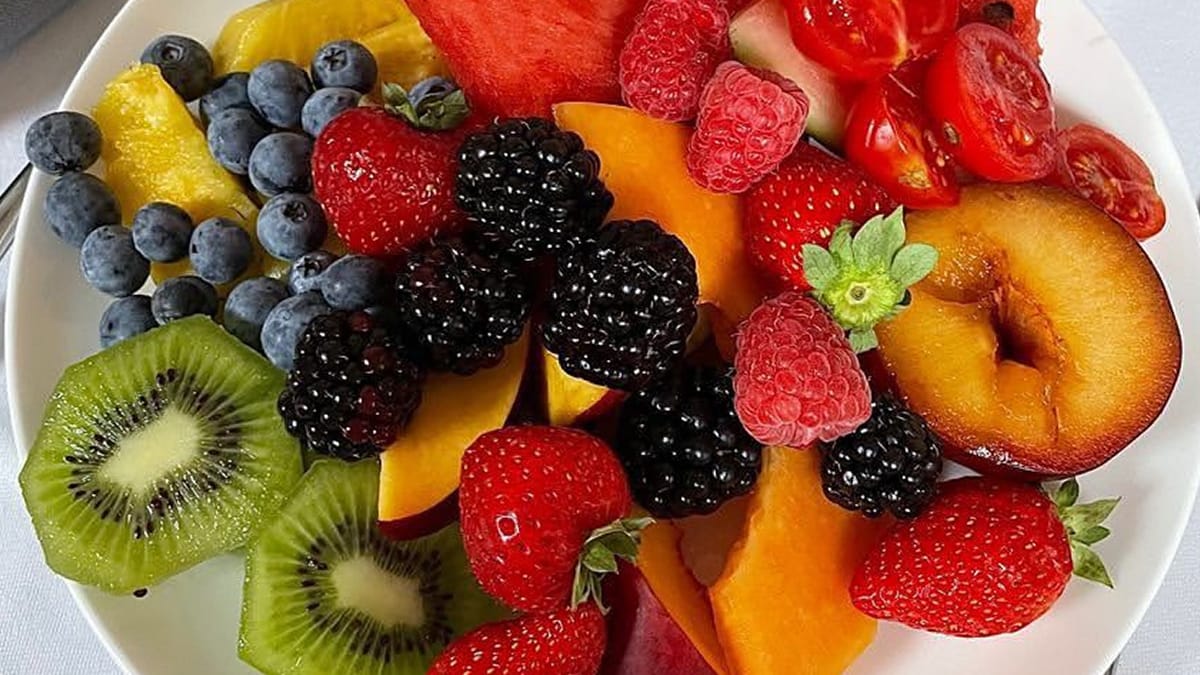Is Your Favorite Snack Sabotaging Your Waistline?
It sounds innocent. Juicy, sweet, packed with vitamins. You reach for it daily, believing it to be nature’s candy. But what if that fruit, that guilt-free treat you cherish, is actually expanding your gut and silently stalling your fitness goals?
Let’s uncover the truth.
The Silent Belly Bloater: Fructose Overload
Fruits are healthy, yes. But not all fruits are created equal. Some, like bananas, grapes, mangoes, and even dates, are extremely high in fructose – a type of natural sugar that, when consumed in excess, wreaks havoc on your gut.
Fructose is metabolized differently than glucose. It bypasses the usual energy-burning process and goes straight to the liver, where it can be turned into fat. The result? Accumulated visceral fat around the abdomen and increased waist size.
Here’s the twist: Your body doesn’t signal fullness the same way it does with other sugars. So you keep eating. And the cycle continues.
Scientific Insight: What Experts Are Saying
Dr. Robert Lustig, a pediatric endocrinologist at UCSF and a vocal critic of sugar, has warned for years about fructose toxicity. In his research, he shows that excessive fructose consumption leads to fatty liver disease and obesity even from fruit.
Even nutritionist JJ Virgin echoes this, stating: “Fruit is nature’s candy, but too much of it can absolutely wreck your waistline.”
So what’s the problem? We’re not talking about apples or berries. We’re talking about tropical, high-fructose fruits that sneakily spike your sugar levels.
Fructose and Gut Bacteria: A Dangerous Mix
Too much fructose disrupts your gut microbiome. It feeds the wrong kind of bacteria, leading to:
- Bloating
- Gas
- Cravings for more sugar
- Sluggish metabolism
And worse, this gut imbalance (called dysbiosis) can lead to chronic inflammation—the silent root of weight gain, brain fog, and fatigue.
You Think You’re Being Healthy, But…
You make a smoothie every morning. Banana, mango, dates, maybe some honey. You’re thinking: this is clean eating.
But that one glass may pack over 50 grams of sugar. That’s more than a can of soda. Except it’s disguised as health.
Here are some of the most common fruit offenders that may be expanding your gut:
- Bananas
- Mangoes
- Grapes
- Dried fruits (like dates, raisins, apricots)
- Watermelon
Not that they’re evil. But frequency and quantity matter. It’s what you don’t realize that hurts you most.
Real People, Real Regrets
Jake, 29, from LA, shared his story: “I was doing everything right—or so I thought. Tons of fruit, clean meals, daily workouts. But my belly just wouldn’t budge. My trainer pointed out my morning smoothie. I swapped mangoes and bananas for greens and berries. Two months later, I was down 7 pounds.”
The Better Fruit Choices
Instead of fruit high in fructose, go for these options:
- Blueberries: low in sugar, high in antioxidants
- Raspberries: high fiber, very low sugar
- Strawberries: refreshing and gut-friendly
- Green apples: moderate sugar, lots of fiber
- Avocados: technically a fruit, rich in healthy fats
When you make smarter fruit choices, your gut shrinks, your energy rises, and the sugar crashes disappear.
How Much Is Too Much?
Stick to 1-2 servings of fruit daily, preferably earlier in the day. Combine it with healthy fats or protein to slow the sugar absorption.
Watch your smoothies, juices, and dried fruit snacks. These are the real traps. Eat whole fruits instead of drinking them.
5 Warning Signs You’re Overdoing It on Sweet Fruit
- You feel bloated even after healthy meals
- Your waistline isn’t shrinking despite workouts
- You crash after breakfast or midday
- You crave more sweets in the afternoon
- Your stool is irregular or gassy
If any of these feel familiar, it might be time to check your fruit habits.
What to Do Now: Immediate Solutions
- Replace tropical fruits with berries and green apples
- Add greens to your smoothies, reduce sweet fruit
- Limit dried fruit to occasional use only
- Pair fruit with nuts or Greek yogurt
- Stay hydrated to support digestion
FAQ
Which fruits should I avoid if I want to lose belly fat? Avoid fruits high in fructose like bananas, mangoes, grapes, watermelon, and dried fruits if consumed excessively.
Are fruits bad for weight loss? No, but portion size and type matter. Overeating high-sugar fruits can stall your weight loss.
Can I still eat bananas and lose weight? Yes, in moderation. Bananas are best post-workout or before exercise for quick energy.
What fruits help reduce belly fat? Berries, green apples, grapefruit, and avocados are excellent for managing belly fat.
Is fruit juice healthy? Most store-bought juices are high in sugar and lack fiber. Eat the whole fruit instead.
What is the healthiest time to eat fruit? Morning or before physical activity is ideal. Avoid sweet fruits at night.
Can dried fruits cause weight gain? Yes. They’re calorie-dense and high in sugar. Eat in small amounts only.
5 Smart Tricks to Avoid Sweet Fruit Belly Bloat
- Read labels, avoid fruit concentrates
- Make smoothies with 80% greens, 20% fruit
- Avoid fruit right before bed
- Keep a food journal for a week
- Balance every fruit snack with fiber or protein
Final Thoughts: Beat the Belly by Being Fruit-Smart
- Choose low-fructose fruits like berries
- Limit your intake of tropical and dried fruits
- Focus on fiber, not just sweetness
- Eat fruits whole, not juiced
- Understand that “natural sugar” is still sugar
References
This article was informed by insights and studies available on:
www.health.harvard.edu, www.menshealth.com, www.healthline.com/fitness/exercise, www.acefitness.org
Disclaimer
This content is for informational and educational purposes only. It is not intended to replace professional medical advice, diagnosis, or treatment. Always consult your physician before starting any exercise program.

